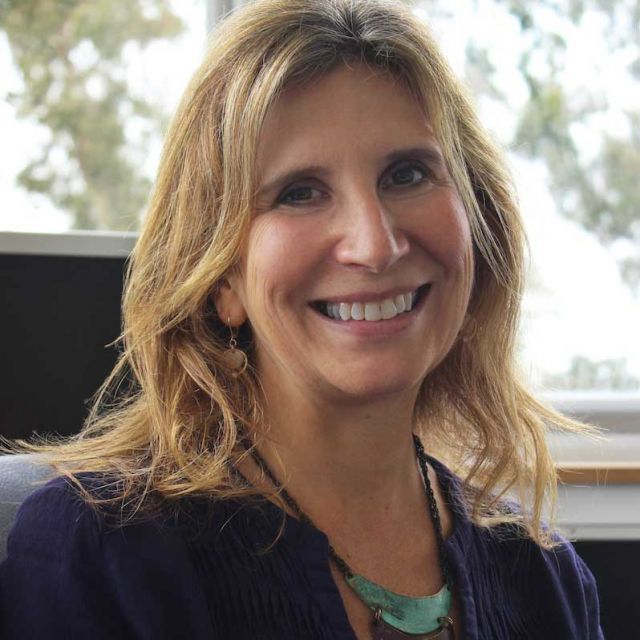
Denise J. Montell
Education
- Ph.D., Neuroscience, Stanford University
- B.S., Biochemistry and Cell Biology, UC San Diego
Biography
Dr. Denise Montell earned her B.S. degree in biochemistry and cell biology at the University of California, San Diego and her Ph.D. in Neuroscience at Stanford University. As an American Cancer Society postdoctoral fellow at the Carnegie Institution she developed a new model for studying cell motility in vivo using a powerful combination of cell biology and molecular genetic approaches. After only two years she attained an independent junior faculty position at the Carnegie and two years later became an Assistant Professor at the Johns Hopkins School of Medicine, rising to the rank of Full Professor in 2002. At the Johns Hopkins University School of Medicine she served as Director of the Graduate Program in Biological Chemistry for 10 years and was the founding director of the Center for Cell Dynamics, an interdisciplinary group of investigators from eight different departments who shared a common interest in observing and manipulating biochemical events and cellular behaviors in real time, in living cells, tissues and organisms. She has served on the Advisory Councils of both the American Cancer Society and the National Institutes of General Medical Sciences and as the 2020 President of the Genetics Society of America. She currently serves on the Board of Scientific Counselors of the National Cancer Institute. She returned to her UC roots in 2013 as the Robert and Patricia Duggan Professor of Molecular, Cellular, and Developmental Biology. She has received numerous awards including the Lucille P Markey Scholar Award, the American Cancer Society Research Investigator Award, and an NIH Director's Pioneer Award. She is an elected fellow of the American Associate for the Advancement of Science and the American Society for Cell Biology.
Research
Cells face a continual struggle between life and death, fought at the biochemical level between pro-death and pro-survival stimuli. Denise Montell's lab discovered a surprising reversibility of the cell suicide process known as apoptosis. Cells that have progressed far beyond steps previously considered to be points of no return can reverse the dying process, recover and go on to proliferate. This has both positive and negative consequences. We are testing the hypothesis that the ability of cells to return from the brink of death – which we have named anastasis (Greek: "rising to life") - serves to salvage cells that are difficult to replace such as heart muscle cells or neurons in the adult brain. Therefore discovering how to enhance anastasis holds the potential to lead to revolutionary new therapies for heart and neurodegenerative diseases.
A second major interest of the lab focuses on cell motility. Without cell migrations embryos could not develop, wounds would not heal and the nervous and immune systems could neither form nor function. But cell movements have a dark side, and the ability to move also contributes to tumor metastasis, which is a major cause of death for cancer patients. Denise Montells lab has developed a new in vivo model for the study of cell motility and employs a powerful combination of molecular genetics, live imaging and photo-manipulation techniques to decipher the molecular mechanisms that determine when, where and how cells move.
A third interest in the lab is to understand how cells adopt the great diversity of shapes and behaviors that are found in nature. Our hypothesis is that a limited set of mechanochemical modules are deployed in a combinatorial fashion to create diversity, analogous to the way that a limited set of amino acids can be combined to create tremendous diversity in protein shape and function.
A fourth major interest in the lab is understanding the regulation of cell engulfment. The lab has recently discovered how to make cells eat other cells alive. While detrimental to normal homeostasis, the lab is exploring how to harness this behavior to enhancer cancer immunotherapy.
Campus Affiliations
Off-campus Affiliations
- Board of Scientific Counselors, National Cancer Institute
- Past President, Genetics Society of America
- CEC, Gordon Research Conferences
- University of California, Cancer Research Coordinating Committee
Awards
- Elected Fellow of ASCB
- Elected Fellow of AAAS
- NIH Director's Pioneer Award
- WM Keck Foundation Award
- American Cancer Society Research Scholar Award
- American Cancer Society Junior Faculty Award
- Lucille P. Markey Scholar Award
- American Cancer Society Postdoctoral Fellowship
- National Science Foundation Predoctoral Fellowship
- Biology Department Honors, UCSD
- Plenary Lecture, National Drosophila Conference
- Plenary Lecture, Society for Developmental Biology Meeting
- NYU School of Medicine Honors Lecture
- Plenary Lecture, American Society for Cell Biology Meeting
- Plenary Lecture, ComBio, Sydney Australia
- Northwestern University H Foundation Symposium Lecture
- University of Cincinnati, William Larsen Lecture
- Plenary Lecture, Society for Developmental Biology Meeting
- Plenary Lecture, National Drosophila Conference